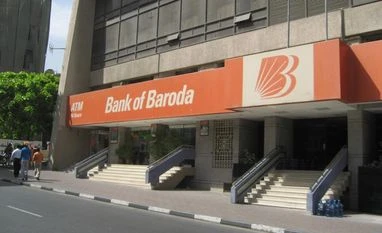This report has been updated.
The second-largest public sector bank, Bank of Baroda, posted a 2.3 per cent year-on-year (Y-o-Y) rise in net profit to Rs 4,886 crore in the fourth quarter of FY24, compared to Rs 4,775 crore. The muted growth is attributed to slow growth in net interest income (NII) and increased cost pressure.
The second-largest public sector bank, Bank of Baroda, posted a 2.3 per cent year-on-year (Y-o-Y) rise in net profit to Rs 4,886 crore in the fourth quarter of FY24, compared to Rs 4,775 crore. The muted growth is attributed to slow growth in net interest income (NII) and increased cost pressure.
Sequentially, the net profit is up 6.70 per cent from Rs 4,579 crore in Q3 FY24.
The NII of the lender rose marginally by 2.3 per cent to Rs 11,793 crore in the quarter under review, from Rs 11,525 crore in the same period last year. “With the cost of deposits fully priced in, the NII is expected to grow by about 10 per cent in FY25,” said Debadatta Chand, MD and CEO, Bank of Baroda.
The net interest margin (NIM) was at 3.27 per cent, compared to 3.53 per cent in the same period last year.
The bank's non-interest income increased by 20.9 per cent in the quarter under consideration to Rs 4,191 crore, from Rs 3,466 crore in the corresponding period last year.
Domestic advances increased by 12.9 per cent Y-o-Y in Q4 FY24 to Rs 9.98 trillion, compared to Rs 7.95 trillion in Q4 FY23. Personal loans grew by 51.6 per cent Y-o-Y to Rs 29,784 crore, from Rs 19,645 crore in the same period last year.
More From This Section
According to the lender, growth in the personal loan segment has slowed from 100 per cent previously, and they are comfortable with the segment growing at around 30–35 per cent Y-o-Y, as they do not see any stress building in this portfolio.
The domestic deposits of the bank increased by 7.7 per cent to Rs 11.28 trillion, compared to Rs 10.47 trillion in the same period last year.
Total expenses increased by 20.79 per cent Y-o-Y to Rs 25,668.77 crore, from Rs 21,249.86 crore in the same period last year.
The asset quality improved. Gross non-performing assets (GNPA) were at 2.92 per cent in the quarter ended March 31, 2024, compared to 3.08 per cent as of December 31, 2023. Net NPA was at 0.68 per cent, down from 0.70 per cent during the same period.
The cost-to-income ratio of the bank in FY24 was 47.71 per cent, compared to 47.72 per cent in FY23. However, Chand said, “With further focus on expenditure optimisation and an increase in earnings, the cost-to-income ratio is expected to decline by 100 basis points to around 46 per cent in FY25.”
The lender's provisions dropped to Rs 1,302 crore in Q4 FY24, from Rs 1,421 crore in the corresponding period last year.
In the reported quarter, the bank set aside Rs 550 crore for its exposure to GoFirst. With this, it has made 100 per cent provisions for this account. The bank had set aside Rs 1,200 crore in Q2 FY24 towards GoFirst.
“We have made 100 per cent provisions and will be able to make a full recovery because the client is highly collateralised. We are confident of the recovery and only expect upside in the segment,” Chand said during a post-results media interaction.
On its digital platform, BoB World, the bank's transaction flow saw nearly a 10 per cent impact due to the Reserve Bank of India's (RBI's) action against the application. However, Chand said that the bank will be able to recover this in the next 3–6 months.
Recently, the RBI lifted restrictions on BoB World and allowed the onboarding of customers onto the application with immediate effect.
Furthermore, Chand said that the bank has taken several steps to address gaps in the process and also plans to increase tech spending while hiring more people in the IT segment. The bank also plans to increase hiring in other segments to compensate for overall attrition due to retirement.
“The bank plans to hire 3,000 people across staff and officer positions. There could be a substantial rise in the hiring of IT experts in addition to the regular intake, keeping pace with transformation and digital banking,” Chand said.
He added, “The normal attrition due to retirement is in the range of 2,000–2,500. Thus, the scale of intake will more than compensate for the attrition and also meet the needs of an expanding and growing organisation.”
)